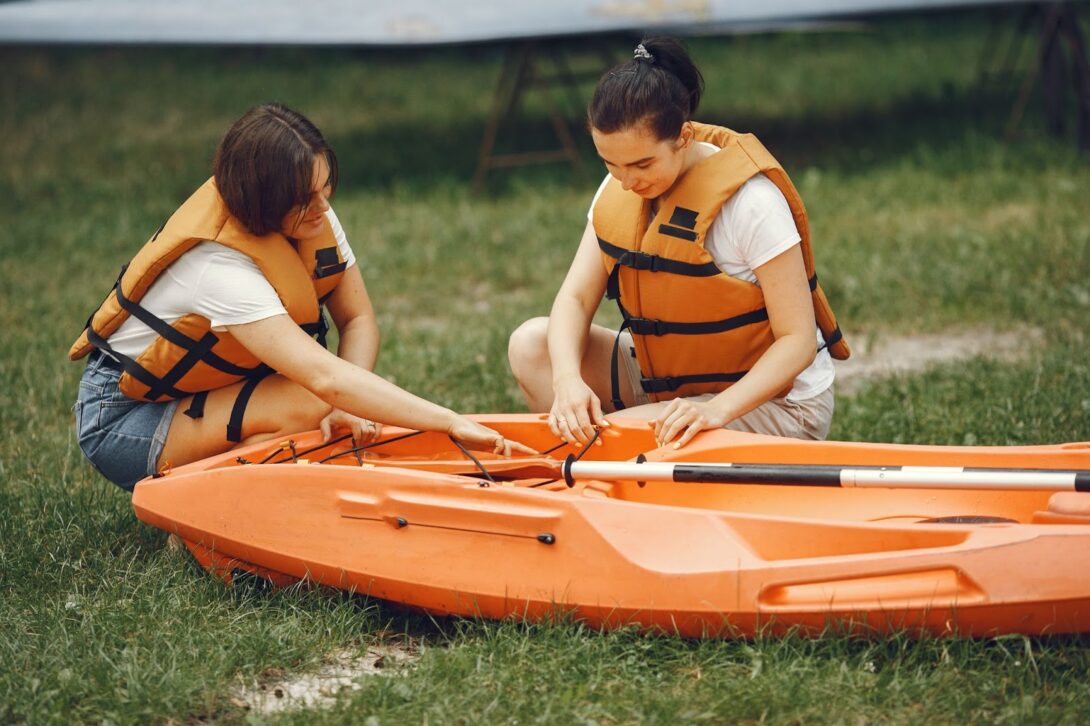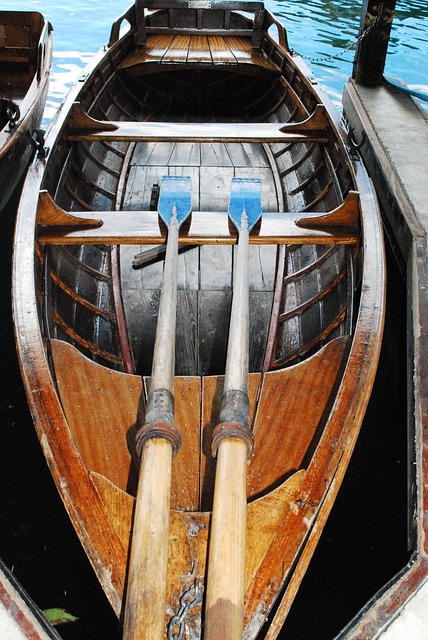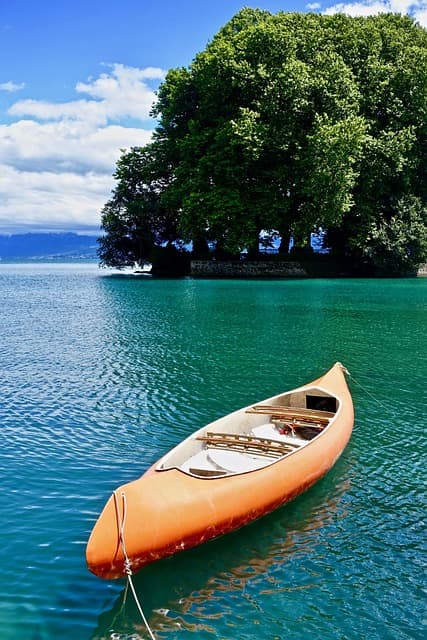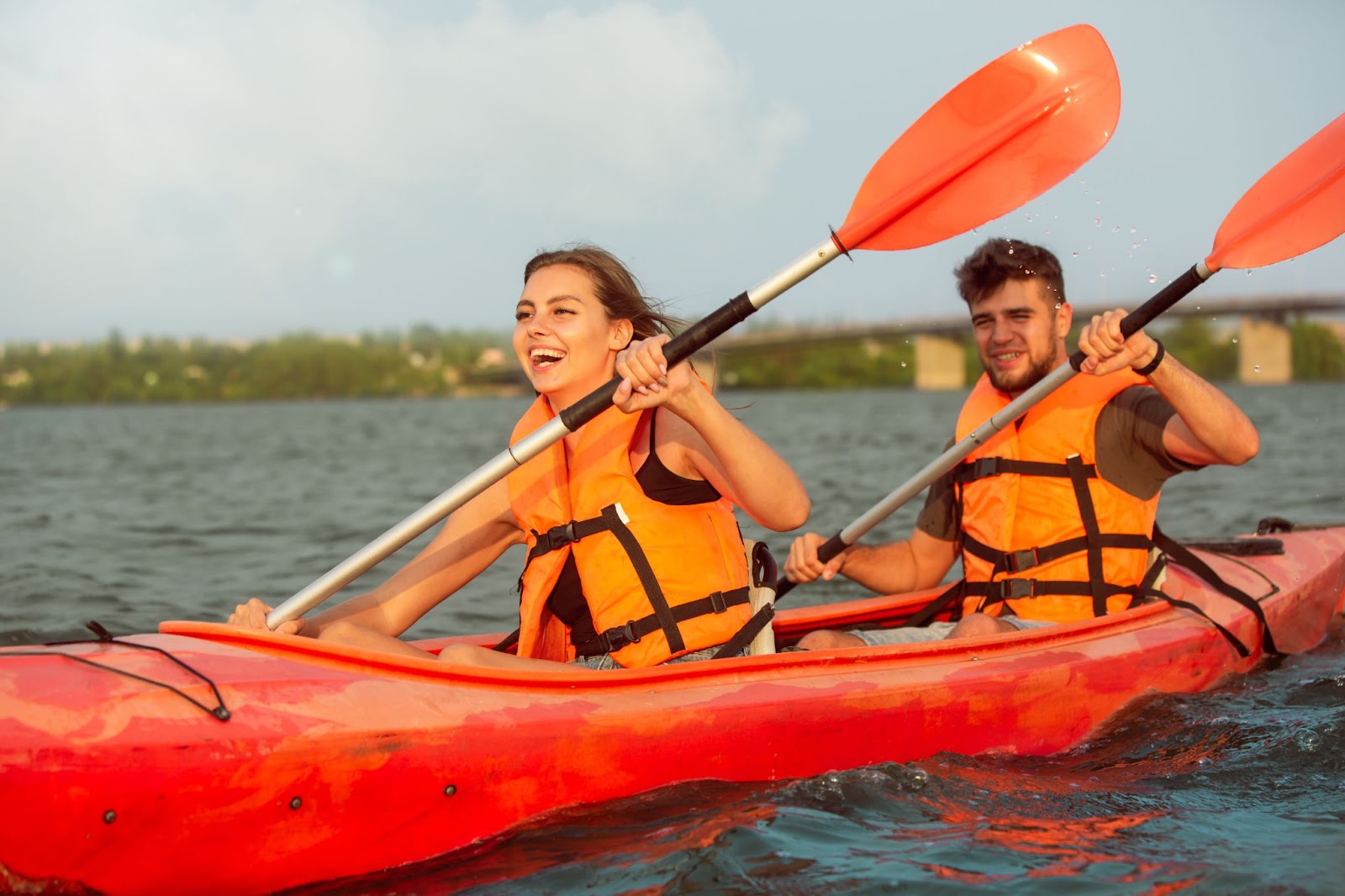Gratefully, the supervisory entities responsible for upholding the boating statutes and regulations of Tennessee aptly recognize the virtue of simplicity. The legal framework governing the usage of canoes and kayaks in the state of Tennessee extends a welcome exemption from the requirement of registration to non-motorized watercraft. Nevertheless, a prerequisite remains in place mandating the presence of a personal flotation device for every individual on board these vessels, alongside the inclusion of a conspicuous sound-emitting apparatus such as a whistle.
Navigating Tennessee’s Canoeing and Kayaking Laws: A Comprehensive Overview
When embarking on the pristine waters of Tennessee for an enchanting canoeing or kayaking adventure, it’s essential to be well-versed in the regulations overseen by the Tennessee Wildlife Resources Agency (TWRA), the custodian of watercraft safety and boating laws within the state.
Governing Body and Resource Hub
Encompassing the vast realm of boating and water safety, including the captivating realm of canoeing and kayaking, the Tennessee Wildlife Resources Agency stands as the guardian of these aquatic activities. Aspiring water enthusiasts, both novices and seasoned paddlers, can explore a trove of knowledge on boating laws and regulations via the following link: Tennessee Boating Laws and Regulations.
Canoe Registration: Embracing the Muscle-Powered Spirit
Celebrate the unbridled freedom of muscle-powered journeys across Tennessee’s waterways, for non-motorized canoes and kayaks are exempt from the rigors of registration or licensing. These elegant vessels, propelled solely by the sheer force of human muscles, dance upon the waters without the need for official documentation.
However, should your aquatic chariot sport any form of mechanical propulsion, irrespective of horsepower or thrust, Tennessee mandates that you embark upon the journey of registration. Displaying the assigned registration numbers prominently on both sides of your vessel ushers you into the realm of compliance and recognition.
The Enigma of Boat Titles
In the wondrous landscape of Tennessee’s waterways, boats remain untitled, a unique and liberating facet within the realm of maritime regulation. As you embark on your aquatic escapades, relish the freedom from the traditional entanglements of boat titling that many states require.
Delve deeper into the nuances of registration and titling through this comprehensive resource: Tennessee Boat Registration and Titling Guide.
Canoe and Kayak Licensing: Unleash Your Paddle-Powered Dreams
Celebrate the simplicity of paddle-powered odysseys, where the sheer force of human will propels your canoe or kayak across Tennessee’s liquid tapestry. When your craft derives its motion from means other than mechanized assistance, the labyrinthine corridors of licensing and registration remain uncharted territories.
Steering the Waters: Canoe and Kayak Operator Insights
Embark upon the waterways with a sense of unburdened liberation, for the majestic realm of non-powered canoes and kayaks, as well as those graced with motors of 8.5 HP or less, demands no specialized education or certification. Traverse Tennessee’s aqueous landscapes with confidence, knowing that the reins of your vessel are not bound by onerous prerequisites.
Venture into the intriguing realm of boating education certification and discover if your paddle-powered vessel requires such accolades: Tennessee Boating Education Certification.
Charting the Waters: Who Needs Boating Education Certification
As the vibrant threads of time weave their tapestry, Tennessee extends its educational embrace to those born after January 1, 1989, who navigate vessels boasting mightier than 8.5 horsepower. Join the ranks of the certified, ensuring safe and informed exploration of the state’s aquatic treasures. It’s worth noting that the majority of canoe and kayak enthusiasts, including those operating craft enhanced with trolling motors, may journey without the mantle of certification.
For those born after January 1, 1989, who grace Tennessee’s waters as non-residents, a harmonious accord is struck with the National Association of State Boating Law Administrators (NASBLA), ensuring that your boating education certification aligns seamlessly with Tennessee’s waters.
Motorized Canoeing: A Symphony of Freedom
In a mesmerizing twist, the echo of Tennessee’s waterways reverberates with the melody of freedom for motorized canoes and kayaks. Boating education cards remain ensconced in the realm of optional, should your motor remain a symphony of 8.5 HP or less. Engage in the joy of piloting your aquatic vessel without the imposition of age-related restrictions, a testament to the state’s embrace of unfettered exploration.
Navigating Sobriety: A Sobering Commitment
A symphony of waterborne exploration should never be tarnished by the discord of alcohol or drugs. Tennessee’s waters echo a steadfast mandate: no individual shall guide a canoe under the intoxicating veil of substances. The threshold of 0.08% blood alcohol content serves as a sentinel against the specter of boating under the influence (BUI), preserving the serenity of waterways for all to relish.
Emergency Equipment: A Lifesaving Ensemble
As dawn’s hues caress the waters and dusk’s shadows embrace the horizon, the shimmering waterways of Tennessee remain poised to captivate the hearts of adventurers. Within this realm of beauty lies an unwavering commitment to safety, manifested through the necessity of accessible wearable personal flotation devices. Each vessel, whether a sleek kayak or a majestic canoe, must embrace the following ensemble of emergency equipment:
- Life Jackets: Crafted under the aegis of U.S. Coast Guard approval, these life-preserving companions must grace the vessel in the correct size and type, ensuring every passenger is safeguarded against the caprices of the waters;
- Navigation Illumination: Amidst the shroud of low visibility, an ethereal glow must emanate from a white navigation light. This luminous sentinel stands as a guardian against collisions, whether the velvety cloak of night descends or the tender embrace of dawn unfurls;
- A Sound Symphony of Safety: Emanating from the heart of preparedness, an emergency whistle takes center stage. Its piercing call pierces the air, an auditory beacon that stands as a testament to the commitment to safety that resonates across Tennessee’s waterways.
Navigating the Waters of Tennessee: Essential Boating Equipment and Regulations
Each state weaves its unique tapestry of boating regulations, and Tennessee is no exception. Embarking on a watery adventure along its scenic rivers and lakes calls for an understanding of the mandated and recommended equipment. Even for those of us with a confident stroke in the water, the habit of donning a PFD has seamlessly become an integral part of the boating ritual.
Casting our gaze upon the labyrinthine waters of Tennessee, we find ourselves pondering the necessary accouterments for a legally compliant and safe journey. Our vessel’s nautical ensemble is a vital ensemble, each piece contributing to a harmonious aquatic ballet.
PFDs: A Sea of Safety
The PFD, or personal flotation device, emerges as the primary custodian of safety on Tennessee’s waterways. The law mandates that every soul aboard a watercraft possesses an accessible and wearable PFD. While Type I, II, III, or wearable Type V PFDs extend the embrace of safety, children under the age of 13 are held in a mandatory embrace of their own—a snugly fitted PFD. These young mariners must wear their life jackets while the vessel dances upon the water’s surface.
A Lifeline: The Throwable Flotation Device
The legal waters of Tennessee do not enforce the need for throwable flotation devices, yet possessing one remains an intelligent choice. Picture it—a buoyant guardian cast into the water, a reassuring handhold should misfortune threaten to capsize your vessel.
Bailing Device: A Trusty Companion
While not etched in legal stone, the manual bailing device is an unsung hero. Bestowing upon you the power to defy a sinking fate, this humble tool is a sensible addition to your aquatic toolkit.
Signals in the Abyss: Visual Distress Calls
Coastal waters echo with the cry of mandatory visual distress signals, but Tennessee’s heartland waters remain untouched by this requirement. Venture forth with your vessel, secure in the knowledge that these signals need not be part of your cargo.
Guiding Lights: Illuminating the Nocturnal Waters
In the embrace of darkness, the unpowered vessel must wield its own illuminating scepter. A beacon of light—be it a lantern or another radiant source—must illuminate the vessel’s path, shielding it from the embrace of unforeseen collisions.
The Symphony of Sound: Auditory Signals
Tennessee’s legal maritime orchestra demands that canoes and kayaks serenade the waterways with more than just whispered ripples. A sound-producing device—a horn, a whistle—must harmonize within the maritime symphony, ensuring your auditory presence on the waterscape.
Unlit Flames: Fire Extinguishers at Bay
Fire may dance upon the land, but the realm of canoes and kayaks remains untouched by the obligation to carry extinguishing agents. Flames, like forgotten memories, need not find a home within your vessel.
Beacons of Hope: Emergency Locator Beacons
Though not woven into the legal code, the emergency locator beacon whispers its necessity into the ears of every paddler’s conscience. Consider it an emblem of prudence, a guardian angel that transcends borders. As you dip your paddle into the water’s surface, remember, it’s not just a beacon; it’s a lifeline, a connection to rescue that stretches beyond the horizon.
Must Adults Don Life Jackets While Voyaging in Canoes or Kayaks Through the Waterways of Tennessee?
Embarking upon the tranquil waters of Tennessee, whether in a canoe or a kayak, demands adherence to a vital safety protocol. Regardless of the vessel’s dimensions, a compelling requirement surfaces: the presence of a United States Coast Guard-approved personal flotation device (PFD) of Type I, II, or III for each individual aboard.

It is prudent to acknowledge a pivotal stipulation, one that bears immense significance. Specifically, youngsters who have not yet crossed the threshold of thirteen years are mandated to adorn themselves with the PFD while engaging in the canoe or kayak experience.
The essence of this directive reverberates in the state of the PFD itself, for its physical state must be impeccable, free from the scars of wear and tear, its straps unmarred by fractures or deficiencies. Accessibility, too, emerges as a vital factor; the PFD must be within arm’s reach, an immediate and tangible recourse. Furthermore, the dimensions of the PFD must align harmoniously with the proportions of its designated wearer, ensuring an optimal fit that augments its life-preserving potential.
Emergency Sound Device Requirement under Tennessee Boating Law
In accordance with the stringent regulations of Tennessee’s boating laws, all watercraft navigating the state’s picturesque waterways are mandated to be equipped with an imperative safety feature—an Emergency Sound Device. This crucial device is designed to emit a piercingly loud noise that serves as an audible beacon of distress, ensuring swift response and aid in case of emergencies.
Irrespective of whether the vessel is motorized or manually powered, such as a canoe or kayak, the legal mandate stipulates the necessity of a whistle or a powered horn. Remarkably, the human voice, despite its potential volume, does not meet the stringent standards set by the Tennessee authorities.
While alternative options like air horns exist, the humble whistle emerges as an exemplar of efficiency and practicality. Its compact size and budget-friendly cost belie its robust impact. Beyond these benefits, the whistle offers unparalleled convenience, as it remains maintenance-free throughout its lifespan. Unlike other devices that necessitate periodic replacement or recharging, the whistle stands resolute, only requiring attention if misplaced.
Canoe and Kayak Illumination Guidelines as Per Tennessee Boating Law
Exploring the serene waters of Tennessee aboard an unpowered canoe or kayak is an experience cherished by many. Ensuring safety during such nocturnal escapades, however, is a paramount concern addressed by the state’s comprehensive regulations. When navigating the darkened expanse, specific lighting requisites come into play to mitigate collision risks and safeguard waterway participants.
For unpowered vessels, a conspicuously bright white lantern takes center stage as a beacon of awareness. This luminous device, projecting an illuminating radiance visible from every conceivable angle, stands as a testament to Tennessee’s unwavering commitment to maritime safety. Importantly, its presence is mandated to thwart potential collisions by granting ample time for evasive maneuvers.
When anchored away from designated mooring areas, an unambiguous command mandates the display of a white light that ensures visibility from all vantage points. Additionally, the state extends its emphasis on safety during twilight hours, encouraging operators of canoes and kayaks to further enhance their visibility by exhibiting bow red/green lights while in motion.
Fire Safety Provisions for Tennessee Canoe and Kayak Enthusiasts
The tranquility of a leisurely paddle along Tennessee’s waterways is a cherished pastime for many. Amid the serenity, however, the importance of fire safety should not be undermined. While fire extinguisher requirements do not extend to canoes or kayaks, prudent measures remain in place to address potential hazards.
Given the nature of these watercraft, a simplified approach is advocated should a fire-related situation arise. A controlled capsize or the swift application of water emerges as a pragmatic and effective response to douse any incipient flames. Recognizing the unique context of canoe and kayak usage, these measures are tailored to align with the inherent characteristics of these vessels, offering a reassuring level of preparedness against unexpected fire incidents.
Conclusion
In conclusion, the exploration of Tennessee’s kayaking laws reveals the critical balance between fostering recreational enjoyment of its abundant waterways and ensuring the safety and preservation of its natural resources. These laws, designed to govern various aspects of kayaking, including safety equipment requirements, navigation rules, and environmental protections, underscore the state’s commitment to both the well-being of its residents and the conservation of its unique aquatic ecosystems.



